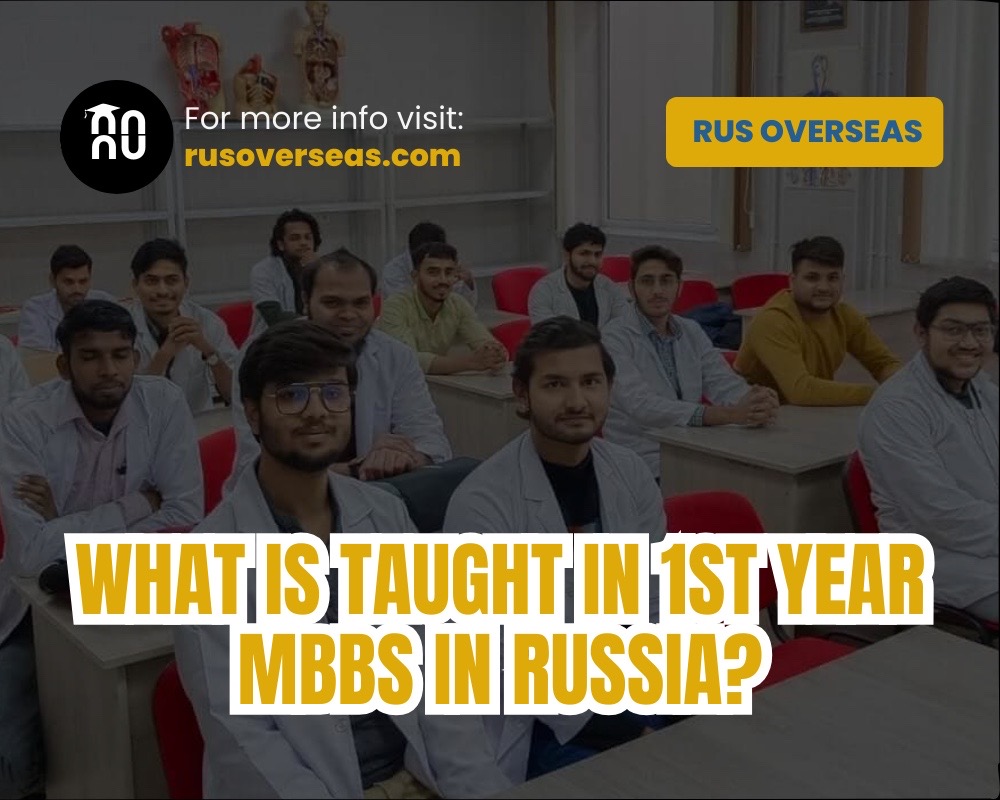What is Taught in the 1st Year MBBS in Russia?

Right, so you're heading off for your first year of MBBS in Russia? Congratulations! It's a leap of faith. Let me get into detail on what you will learn – all about establishing that rock-solid foundation that will be necessary for the remainder of your medical career. View the first year as mastering the alphabet before being able to pen a novel!
The Foundation Stones of a Physician:
Your first year will usually be split into two semesters (like halves of a school year), and they're gonna be pretty packed. Don't fret, though – everybody's in the same situation. Here's the substance of what you'll be getting into:
• Human Anatomy: Prepare to Dissect! This is where you'll discover all the nooks and crannies of the human body. You'll be working with cadavers (that's a real human body that's been preserved), and it's definitely a unique experience. It's not just memorizing names, though! You'll need to understand how everything works and fits together. Expect lots of lectures, lab practicals in the dissection room, and maybe even some wacky virtual reality devices.
• Physiology: How the Body Works. You now know what the body's composed of (thanks, Anatomy!), now you're going to learn how it all works. How does blood get circulated through the heart? How do the lungs receive oxygen in? How does your brain cause all these things to happen? It's more of a "why" than memorizing, actually. Get ready to study diagrams, do experiments, and think some tough problems out.
• Biochemistry: The Chemistry of Life. This is all about the chemical processes that keep us alive. What are proteins, carbs, and fats? How do they work in our bodies? How do they break down and provide energy? Knowing biochemistry is key to understanding how diseases work. Expect a good amount of lab work where you’ll be doing different chemical tests and analyzing samples.
• Medical Biology: The Small Stuff. This will usually encompass things such as microbiology (germs!), genetics (how you inherit your traits), and cell biology (what cells are made of). You'll learn about bacteria, viruses, and other tiny things, how they cause disease, and how our bodies protect against them. You'll find out about DNA, how it gets passed on, and how cells work on a microscopic level. Plenty of microscope time and lab experimentation here as well.
• Medical Terminology and Latin: The Language of Medicine. Doctors speak their own language, and this course exposes you to the basics. You'll learn Latin roots, prefixes, and suffixes so you can read those long, complicated medical words. It's like learning a second language, but it's required to read medical literature and communicate with other healthcare professionals. Buckle up for tons of vocabulary quizzes!
• Introduction to Clinical Practice (Maybe): Some universities will start introducing you to the patient side right away. This may be things such as medical ethics, patient communication, and basic exam skills. It's an excellent means of getting a feeling for what being a doctor is really like early on.
How You'll Learn and Be Tested:
Expect a mix of lectures, lab practicals, and maybe even some online content. You'll be tested regularly with quizzes and exams. There will also be practical exams to make sure you can actually do the things you're being taught, like dissecting or doing lab tests. You'll also probably have seminars where you discuss topics with your classmates and professors.
How to Ace Your First Year:
• Learn biology and chemistry beforehand: It will be much easier.
• Organize yourself: Develop good study habits and learn to manage time.
• Don't be afraid to ask for help: Take a study group, talk to your teachers, and get tutoring if needed.
• Stay proactive: Don't wait until the last minute to start studying.
The first year of MBBS is challenging, but it's also incredibly rewarding. It's where you set the tone for your entire medical career. So, buckle up to work hard, learn a lot, and pick up a few new friends on the way! You've got this!
SIMPLE ADMISSION PROCESS
No hefty donations, no entrance exams, no hassle for documentation just your dream MBBS study and you. RUS OVERSEAS does everything for you from scratch. We make sure you don’t have to do rounds of rotation and get fed up with the process of admission. From beginning to end, we are with you.
THE PROCESS
Eligibility:
- 50% in PCB (40% for SC/ST/OBC) in Class 12.
- Minimum 17 years by December 31 of the admission year.
- NEET Qualification: Mandatory for Indian students.
Invitation letter:
After RUS OVERSEAS submits your documents in the university. The university issues you an invitation letter.
Visa process:
Once the invitation letter arrives. The company will start your visa processing and in a few days you will be on the plane to Russia.
HOW RUS OVERSEAS HELPS YOU IN YOUR JOURNEY
RUS OVERSEAS has the experience of more than a decade. Our team is supportive and cares for the students wholeheartedly. We are available 24/7. Your one stop solution for MBBS abroad is us. We at RUS OVERSEAS will never disappoint any student or parent in their fulfilling journey with us.
CONTACT US
Phone: +91 9560533703
Email: info@rusoverseas.com
Rus Overseas provides expert assistance in choosing the right program, application processing, visa support, and settling in Russia. Contact us today to begin your abroad journey in Russia!
Sakib Hasan

